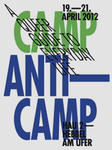Camp / Anti-Camp - A Queer Guide to Everyday Life (Berlin, April 19 - 21, 2012)
type=project
Curated by Susanne Sachsse and Marc Siegel
19 until 21 April
Thursday, April 19th
18.00 h Opening with Susanne Sachsse and Marc Siegel
19.00 Uhr Concert with Holly Woodlawn (Los Angeles), Special Guest: Tangowerk (Berlin), Discussion with Bruce LaBruce (Toronto)
21.00 Uhr Lecture with Douglas Crimp (New York)
22.45 Uhr Performance with Narcissister (New York)
23.30 Uhr Vaginal Davis is Speaking From the Diaphragm, Talkshow Performance with guest
Freitag, 20. April
12.00 Uhr Films Camp/Anti-Camp Clips 2
12.30 Uhr Lecture with Juliane Rebentisch (Ffm.)
14.00 Uhr Lecture with Elizabeth Lebovici (Paris)
15.00 Uhr Video / Presentation by Max Jorge Hinderer Cruz
16.00 Uhr Lecture with Nguyen Tan Hoang (Philadelphia)
18.30 Uhr Tropicamp: Introduced and moderated by Max Jorge Hinderer Cruz (Berlin), Lectures with Juan A. Suárez (Murcia) and Frederico Coelho (Rio de Janeiro), Performance with RG_Faleiros (São Paulo), Film Respectable Creatures by Jack Smith
21.30 Uhr Performance with Carmelita Tropicana (New York)
22.00 Uhr Vaginal Davis is Speaking From the Diaphragm
Samstag, 21. April
12.00 Uhr Films Camp/Anti-Camp, Clips 3
12.30 Uhr Lecture with José Muñoz (New York)
13.30 Uhr Lecture with Heather Love (Philadelphia)
15.00 Uhr Presentation by Richard Move (New York), Discussion with Douglas Crimp (New York)
16.30 Uhr Lecture with Gavin Butt (London)
19.00 Uhr Lecture in German with Diedrich Diederichsen (Wien)
20.30 Uhr Videoclip-Presentation by Bruce LaBruce (Toronto)
22.00 Uhr Performance with Jakob Lena Knebl & Hans Scheirl (Wien)
22.30 Uhr Performance via Skype with Taylor Mead (New York)
23.00 Uhr Vaginal Davis is Speaking From the Diaphragm
23.45 Uhr Concert with Tenderloin (Berlin) and The Voluptuous Horror of Karen Black (New York)
For some, camp is a lie that tells the truth. For others, it's an unexpectedly intense commitment to the seemingly trivial. Some say that camp is so bad that it's good. For others, it's so good that it calls into question dominant value systems. Camp is a relatively established if difficult to pin down term in popular discourse and academic scholarship that has its origins in queer subcultural practice and slang. It refers both to a perverse and productive perspective on cultural products and to a flamboyant lifestyle. Moreover, camp provides new ways of looking at popular culture, cinema, performance and stars, as well as aesthetics, consumer-capitalism, gender identity and community. According to American literary scholar Eve Kosofsky Sedgwick, camp differs fundamentally from kitsch, even though both describe undervalued cultural products and practices. For Sedgwick, kitsch is best understood as a form of attribution, while camp involves a process of recognition. Kitsch-attribution, for example, poses the rhetorical question: “What kind of debased creature could possibly be the right audience for this spectacle?” Camp-recognition, on the other hand, emerges from the simple question “what if”: “What if the right audience for this were exactly me? What if, for instance, the resistant, oblique, tangential investments of attention and attraction that I am able to bring to this spectacle are actually uncannily responsive to the resistant, oblique, tangential investments of the person, or of some of the people, who created it? And, what if, furthermore, others whom I don’t know or recognize can see it from the same ‘perverse’ angle?”
"Camp/Anti-Camp" will interogate camp discourse by confronting it with a variety of cultural practices, including those typically described as camp and those seemingly unrelated to it. What if we juxtapose this discourse with hybrid international practices that tap into cultural, ethnic and historical traditions that are beyond the confines of queer culture? With exemplary performances and films, as well as with presentations by scholars and artists, the festival intends to question the explanatory power of camp discourse for a multitude of underrated cultural practices.
Following Mae West's credo that “too much is not enough,” the festival offers nothing but highlights, including an intimate evening with queer icon and Warhol superstar Holly Woodlawn and a concert-event by the sexually-transgressive cult performer Kembra Pfahler with her band “The Voluptuous Horror of Karen Black.” There will also be performances by New York downtown legend Carmelita Tropicana, the young mysterious club act Narcissister and the notorious Austrian artist-duo Jakob Lena Knebl/Hans Scheirl. Moreover the festival will feature presentations by international scholars such as Douglas Crimp, Diedrich Diederichsen, Elizabeth Lebovici, José Muñoz and Juliane Rebentisch, and by artists such as Bruce LaBruce and Richard Move. Every evening the award-winning homo-core queen Vaginal Davis will bring festival guests and figures from Berlin's cultural scene together for her talk-show performance “Vaginal Davis is Speaking from the Diaphragm.” Scholar Max Jorge Hinderer Cruz curated a section of the festival that explores the concept of tropicamp and focuses on tropicalism and internationalism in the avant-garde, Brazilian singer and Hollywood film star Carmen Miranda and contemporary performance impulses from Brazil. Tropicamp is a term coined by Brazilian artist Hélio Oiticica as a means of expressing his fascination for the anti-commercial tendencies within the 1960s US underground film scene (primarily the work of Mario Montez and Jack Smith). This section will offer an internationalist critique of camp discourse. Festival events will be complemented by films (by Hélio Oiticica and Jack Smith, among others), food performances (Foodgasm) and book and DVD-offers by b_books. Feel-good substances from the Voodoo Chanel Altar Bar will guarantee “Camp/Anti-Camp: A Queer Guide to Everyday Life” its uppers and downers.

